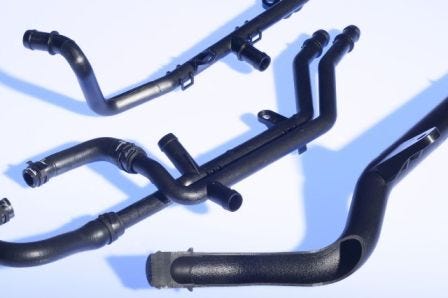Teklas (Gebze, Turkey) has recently started to produce fluid-carrying tubes for automobiles in high volumes using water-assisted injection molding technology (WIT). The parts use a special grade of Ultramid A3HG6 WIT polyamide (PA) developed for the process by BASF (Ludwigshafen, Germany).
November 25, 2011
Teklas (Gebze, Turkey) has recently started to produce fluid-carrying tubes for automobiles in high volumes using water-assisted injection molding technology (WIT). The parts use a special grade of Ultramid A3HG6 WIT polyamide (PA) developed for the process by BASF (Ludwigshafen, Germany).
This glass fiber reinforced PA 66 grade enables good inside and outside surfaces to be formed as well as offering the required high chemical resistance. A new series of tubes that Teklas is currently developing for almost all large European automobile manufacturers provide individual conveying of cooling water, air and oil in the engine compartment.
|
Turkish processor makes application advances with water-assisted injection molding. |
In addition to minimal resistance to the fluid being conveyed, a low pressure drop is one of the primary requirements that fluid-conveying tubes in the engine compartment must satisfy. Thus, the inside surfaces have to be especially smooth. For the parts to be economical, the wall thickness must be uniform and as thin as possible. Just as the number of car models continues to increase, so do constraints within the engine compartment, so that maximum design freedom and flexibility for the manufacturing process is essential when it comes to developing very specific, integrated solutions. By using the latest technology for injection molding, Teklas is able to manufacture a variety of tube shapes and combinations with different wall thicknesses and great complexity. Use of plastic tubes in place of the heavier metal tubes results not only in weight savings, but also eliminates the need for expensive metal working equipment.
For post-molding processing of the tubes, Teklas, which operates a production facility in Kardzhali, Bulgaria, relies on a high level of automation: The numerous finishing steps that are needed in the course of manufacturing the tubes, such as cutting and sanding, and incorporation of metal rings and elastomer (TPE) seals, are performed by robots. This contributes to a low reject rate. Teklas is currently very successful with this innovative WIT process and the wide range of manufacturing options, and is supplying and developing a variety of different tubes. Plans already call for expanding capacity.-[email protected]
About the Author(s)
You May Also Like



